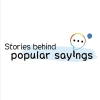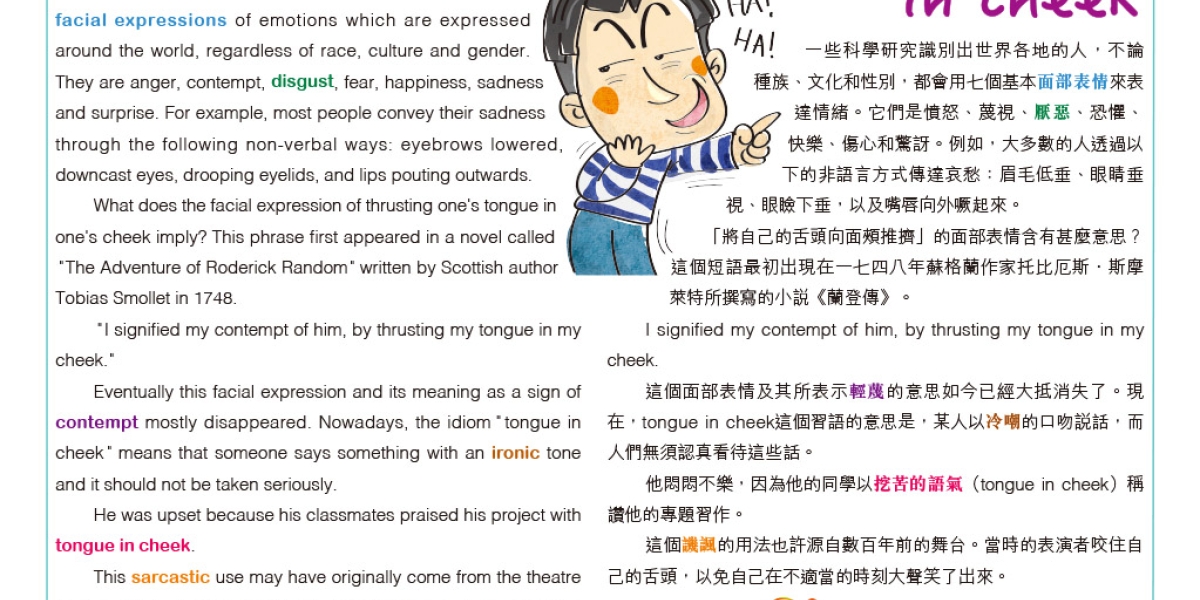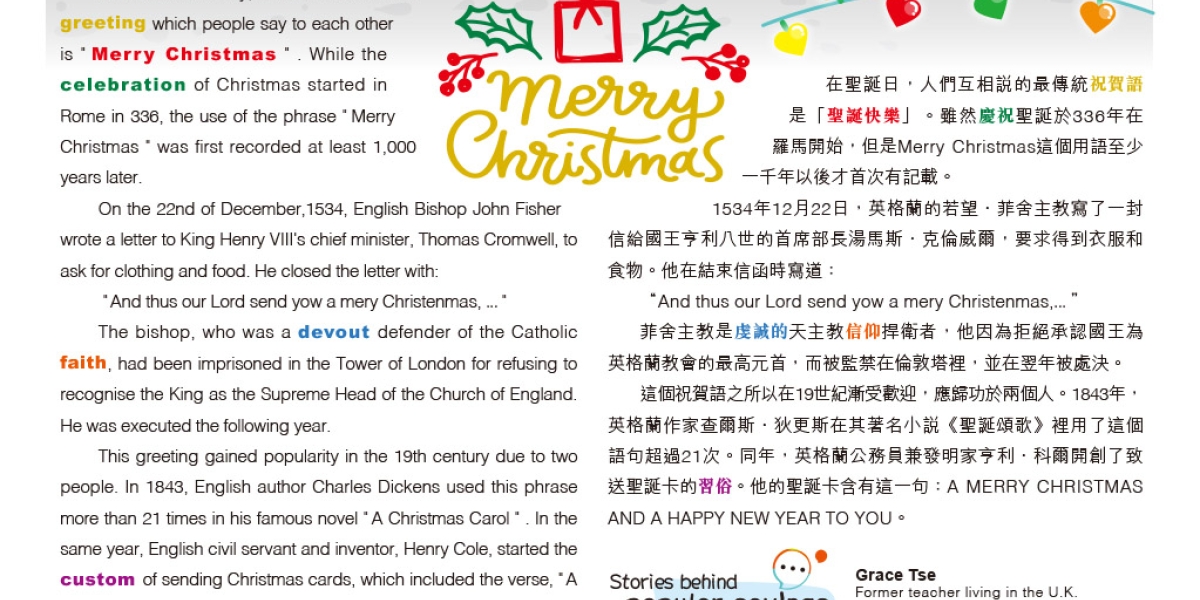昔日文章


Stories Behind Popular Sayings
2021.04.23
Don’t bite the hand that feeds you
When someone has helped us, we should say " thank you " to show our gratitude. If we are rude to that person, we might receive the following comment:
" Don't bite the hand that feeds you! "
Imagine that you feed a hungry animal and it bites you on your hand. What would your feeling be? You probably feel hurt both physically and mentally. This is not only because your hand might be bleeding due to the bite, but also because the animal has harmed you when you are trying to care for it. Thus, metaphorically this expression implies that someone is being unthankful or unappreciative to a benefactor.
This phrase first appeared in print in a political pamphlet by the Irish politician Edmund Burke in 1770. Although the origin of this expression remains uncertain, one of Aesop's Fables, " The Gardener and His Dog " , carried a similar meaning. In the story, the gardener's dog was playing near a deep well and fell into it by accident. The gardener ran to rescue it. However, as he tried to pull the dog out, it bit him on the hand.
當有人幫助我們的時候,我們就應該說「謝謝你」,以表示我們的感激之情。如果我們對那人粗魯無禮,我們也許會得到以下的評語:
Don't bite the hand that feeds you! (「別忘恩負義!」)
設想你餵一隻饑餓的動物吃東西, 牠卻咬你的手。你會有甚麼感受?你可能覺得自己的身心都受到傷害。這不僅僅因為你的手因被咬而流血,還因為那隻動物在你試圖照顧牠時傷害了你。因此,從比喻來說,這個語句暗指某人對恩人並不心存感激或毫不感恩。
這個短語最初出現在1770年愛爾蘭政治家愛德蒙.柏克所撰寫的政治小冊子裡。雖然這個語句的根源依然無法確定,但是《伊索寓言》之一《園丁和他的狗》含有類似的意義。在這個故事中,園丁的狗在一個深井旁邊玩耍,不小心跌進井中。園丁跑去救牠。可是, 當他設法把狗拉出來的時候,狗卻咬他的手。
捐款支持公教報 http://kkp.org.hk/donation


Stories Behind Popular Sayings
2021.03.19
Head in the clouds
What are clouds? Scientists say that clouds are made up of tiny water droplets or small ice crystals suspended in the atmosphere at different heights. Small children say that clouds are white sheep or puffs of cotton.
Is it a compliment when your teacher says the following sentence to you in class?
" You have your head in the clouds."
The idiom "head in the clouds" , which means daydreaming or not paying attention, was first recorded in a novel entitled " Leonora " by Maria Edgeworth in London in 1806.
" You would have a wife with her head in the clouds, would you? "
When the scientific studies of clouds were still being developed, clouds were considered as formless and obscure things high up in the sky out of reach from human beings. Based on this perception, the imagery of the idiom " head in the clouds " refers to someone whose mind is very far away or who has unrealistic expectations.
The opposite of this idiom is " have your feet on the ground", which means to be practical and sensible.
雲是甚麼?科學家說,雲是由懸浮在大氣層中的微小水珠或細小冰晶所形成的,處於不同高度。幼童說,雲是白綿羊或棉花團。
如果老師在課堂裡對你說出以下的句子,那是否誇獎你呢?
You have your head in the clouds.
Head in the clouds這個習語的意思是做白日夢或不留心。它最早記載於1806年在倫敦出版、由瑪麗亞.埃奇沃斯撰寫的小說《利奧諾拉》。
You would have a wife with her head in the clouds, would you?
昔日,當關於雲的科學研究還在發展中的時候,雲被認為是沒有形狀、朦朧不清的東西,高高掛在天空上,對人類是遙不可及的。基於這個概念,head in the clouds這個習語的比喻指的是一個人心不在焉或有著不切實際的期望。
這個習語的相反說法是have your feet on the ground,意即實事求是、通達明智。
捐款支持公教報 http://kkp.org.hk/donation


Stories Behind Popular Sayings
2021.03.12
Tongue in cheek
Some scientific studies have identified seven basic facial expressions of emotions which are expressed around the world, regardless of race, culture and gender. They are anger, contempt, disgust, fear, happiness, sadness and surprise. For example, most people convey their sadness through the following non-verbal ways: eyebrows lowered, downcast eyes, drooping eyelids, and lips pouting outwards.
What does the facial expression of thrusting one's tongue in one's cheek imply? This phrase first appeared in a novel called
" The Adventure of Roderick Random " written by Scottish author Tobias Smollet in 1748.
" I signified my contempt of him, by thrusting my tongue in my cheek. "
Eventually this facial expression and its meaning as a sign of contempt mostly disappeared. Nowadays, the idiom " tongue in cheek " means that someone says something with an ironic tone and it should not be taken seriously.
He was upset because his classmates praised his project with tongue in cheek.
This sarcastic use may have originally come from the theatre centuries ago, when the performers bit their tongues to stop themselves from laughing out loud at the wrong moment.
一些科學研究識別出世界各地的人,不論種族、文化和性別,都會用七個基本面部表情來表達情緒。它們是憤怒、蔑視、厭惡、恐懼、快樂、傷心和驚訝。例如,大多數的人透過以下的非語言方式傳達哀愁:眉毛低垂、眼睛垂視、眼瞼下垂,以及嘴唇向外噘起來。
「將自己的舌頭向面頰推擠」的面部表情含有甚麼意思? 這個短語最初出現在一七四八年蘇格蘭作家托比厄斯.斯摩萊特所撰寫的小說《蘭登傳》。
I signified my contempt of him, by thrusting my tongue in my cheek.
這個面部表情及其所表示輕蔑的意思如今已經大抵消失了。現在,tongue in cheek這個習語的意思是,某人以冷嘲的口吻說話,而人們無須認真看待這些話。
他悶悶不樂,因為他的同學以挖苦的語氣(tongue in cheek)稱讚他的專題習作。
這個譏諷的用法也許源自數百年前的舞台。當時的表演者咬住自己的舌頭,以免自己在不適當的時刻大聲笑了出來。
捐款支持公教報 http://kkp.org.hk/donation


Stories Behind Popular Sayings
2020.12.18
Merry Christmas
On Christmas Day, the most traditional greeting which people say to each other is " Merry Christmas " . While the celebration of Christmas started in Rome in 336, the use of the phrase " Merry Christmas " was first recorded at least 1,000 years later.
On the 22nd of December,1534, English Bishop John Fisher wrote a letter to King Henry VIII's chief minister, Thomas Cromwell, to ask for clothing and food. He closed the letter with:
" And thus our Lord send yow a mery Christenmas, ... "
The bishop, who was a devout defender of the Catholic faith, had been imprisoned in the Tower of London for refusing to recognise the King as the Supreme Head of the Church of England. He was executed the following year.
This greeting gained popularity in the 19th century due to two people. In 1843, English author Charles Dickens used this phrase more than 21 times in his famous novel " A Christmas Carol " . In the same year, English civil servant and inventor, Henry Cole, started the custom of sending Christmas cards, which included the verse, " A MERRY CHRISTMAS AND A HAPPY NEW YEAR TO YOU " .
在聖誕日,人們互相說的最傳統祝賀語是「聖誕快樂」。雖然慶祝聖誕於336年在羅馬開始,但是Merry Christmas這個用語至少一千年以後才首次有記載。
1534年12月22日,英格蘭的若望.菲舍主教寫了一封信給國王亨利八世的首席部長湯馬斯・克倫威爾,要求得到衣服和食物。他在結束信函時寫道:
“And thus our Lord send yow a mery Christenmas,... ”
菲舍主教是虔誠的天主教信仰捍衛者,他因為拒絕承認國王為
英格蘭教會的最高元首,而被監禁在倫敦塔裡,並在翌年被處決。
這個祝賀語之所以在19世紀漸受歡迎,應歸功於兩個人。1843年, 英格蘭作家查爾斯.狄更斯在其著名小說《聖誕頌歌》裡用了這個語句超過21次。同年,英格蘭公務員兼發明家亨利.科爾開創了致送聖誕卡的習俗。他的聖誕卡含有這一句:A MERRY CHRISTMAS AND A HAPPY NEW YEAR TO YOU。
捐款支持公教報 http://kkp.org.hk/donation


